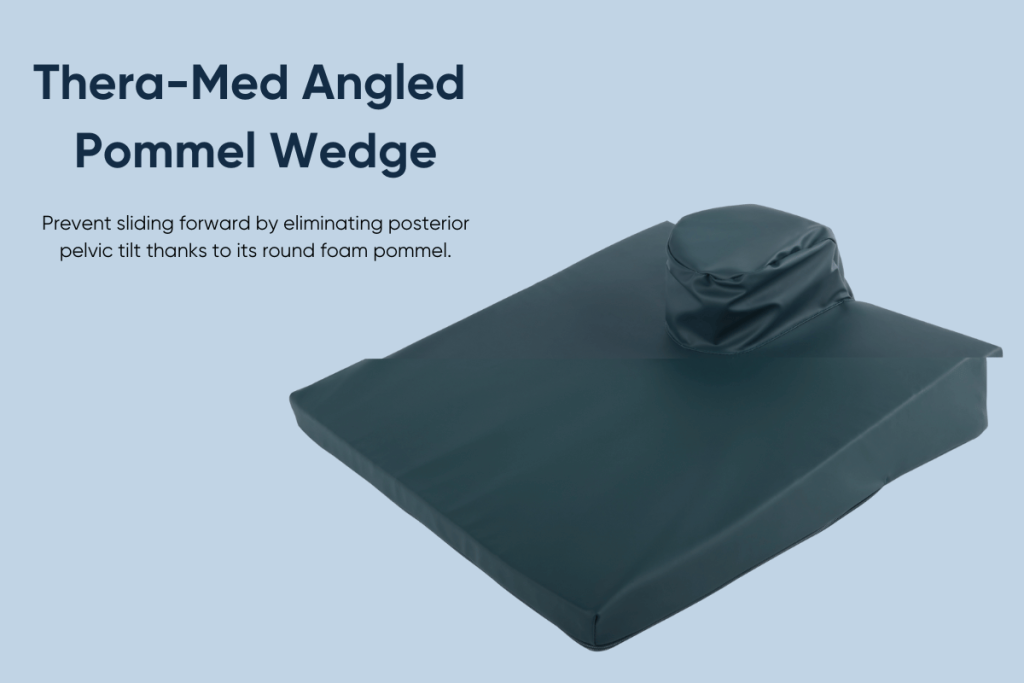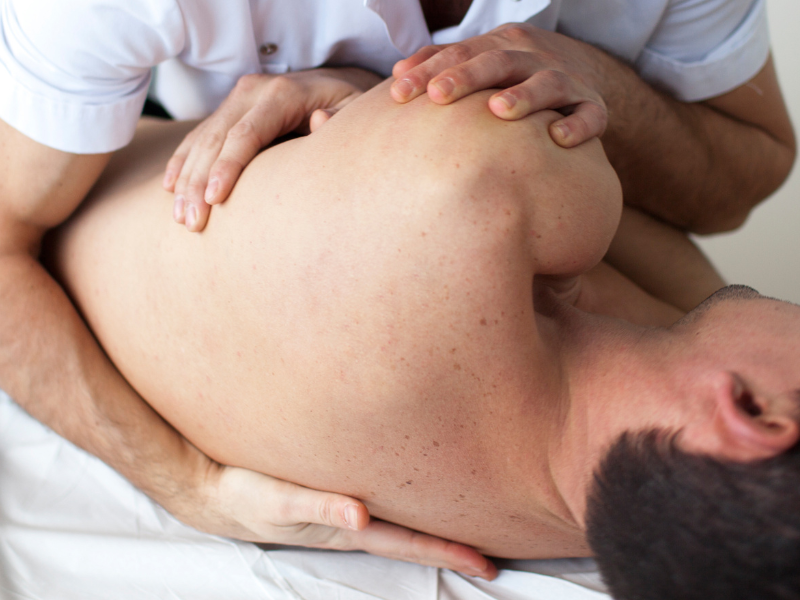From Pressure to Posture: The Well-being of Wheelchair Users Depends on Your Supports
Navigating life from the seat of a wheelchair is a profound adjustment that countless individuals face each year, whether due to sudden accidents, progressive illnesses, or congenital conditions.
The transition to wheelchair reliance not only alters one's physical interaction with the world but also carries deep emotional and psychological impacts. Prolonged seating can impose a host of physical challenges—from pressure sores and spinal misalignments to muscle atrophy—all of which demand constant attention and care.
Beyond the tangible discomforts, the psychological journey is equally daunting; feelings of dependency, frustration, and isolation can emerge, altering one’s sense of self and place within the community. In acknowledging these realities, it's crucial to approach the topic with empathy, understanding, and a commitment to providing support and solutions that enhance the well-being and autonomy of those navigating life on wheels.
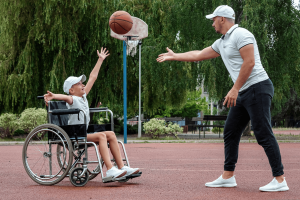
Health Conditions Leading to Prolonged Hours in a Wheelchair
Wheelchair use is not a one-size-fits-all scenario. Various medical conditions can lead to the necessity of a wheelchair for mobility and independence. These conditions range from acute injuries to chronic illnesses, each affecting individuals in distinct ways.
• Spinal Cord Injuries (SCI): Trauma to the spinal cord can result in partial or complete paralysis, significantly impacting an individual's mobility. Depending on the level of injury, some may retain the use of their arms, while others may require full assistance for daily activities. The sudden shift to wheelchair reliance post-injury challenges both physical and mental resilience, as individuals navigate a new reality with profound implications for their personal and professional lives.
• Severe Arthritis: Arthritis, particularly rheumatoid arthritis and osteoarthritis, can severely limit mobility due to pain and joint degradation. For those with severe cases, wheelchairs provide a means to maintain independence while managing pain levels. However, the chronic nature of arthritis also means dealing with fluctuating pain and mobility issues, necessitating adaptive strategies for daily activities and comfort.
• Multiple Sclerosis (MS): MS is a chronic illness that affects the central nervous system, leading to a wide range of symptoms, including significant mobility challenges. Wheelchair use among those with MS can vary greatly, with some individuals requiring it only occasionally, while others may depend on it full-time. The unpredictability of MS, marked by episodes of relapse and remission, adds layers of complexity to managing mobility and maintaining an active lifestyle.
Each of these conditions presents its own set of challenges, not just in terms of physical mobility but also in the adaptations required for daily living and emotional well-being. For individuals with SCI, the sudden loss of mobility can be a tremendous psychological hurdle, necessitating support for both physical rehabilitation and mental health. Those with severe arthritis must navigate the balance between activity and rest, often adjusting their use of mobility aids as their condition progresses. Meanwhile, the unpredictable nature of MS can require a flexible approach to wheelchair use, adapting to changing needs over time.
In facing these challenges, the role of supportive cushions and supports—like specialized pressure cushions and seating solutions offered by Therapeutic Pillows—becomes invaluable.
These products not only alleviate physical discomfort but also enhance the quality of life, empowering individuals to engage with their environments more fully and with greater confidence.
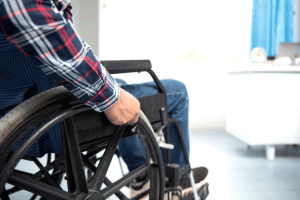
Understanding the Challenges of sitting for prolonged times
The journey of a wheelchair user is paved with various obstacles, each demanding attention and care.
When seated for long periods of time, complications can arise, worsening your health condition and making the seating experience challenging.
Physical challenges
- Pressure Sores: One of the most immediate concerns for individuals spending extensive periods in a wheelchair is the development of pressure sores, also known as decubitus ulcers. These sores occur when the skin and underlying tissues are damaged from prolonged pressure—typically in areas where the bone is close to the skin, such as the tailbone, hips, and heels. Pressure sores can range from mild redness to severe ulcers exposing muscle or bone, posing a significant risk of infection.
- • Spine Alignment and Posture: Maintaining proper posture is crucial for everyone, but for wheelchair users, it's a pivotal aspect of daily comfort and long-term health. Incorrect posture can lead to a cascade of problems, including spinal misalignments, chronic pain, and even respiratory issues. The spine's natural alignment supports not just physical health but also ensures optimal organ function and vitality.
- • Discomfort and Pain: Beyond the risk of sores and alignment issues, the sheer discomfort of remaining in a single position for too long cannot be overstated. This discomfort can exacerbate existing conditions, leading to a cycle of pain and immobility that affects all aspects of life.
- • Incontinence: Mobility issues can exacerbate incontinence, making it harder for individuals to manage urinary continence. This situation not only presents physical and hygienic challenges but also places a substantial emotional and social burden on individuals, as they navigate the complexities of maintaining dignity and cleanliness while engaging in daily activities. The impact of incontinence extends beyond personal health, affecting social interactions and overall well-being.
Social challenges
- Social and Emotional Impact: The constraints of mobility can extend into social isolation and emotional stress. The constant awareness of dependency, along with the physical barriers to spontaneous movement, can lead to feelings of frustration, depression, and isolation.
- • The Strain of Limited Mobility: Facing daily limitations can take a significant toll on one’s mental health. The psychological battle of accepting a different way of life, coupled with the physical discomforts, requires immense inner strength and resilience.
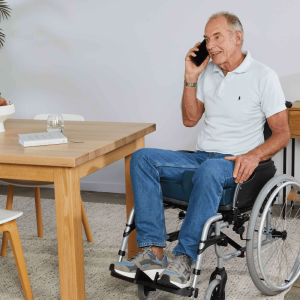
Seating and support solutions to improve your posture and pressure while seated for prolonged hours in a wheelchair
At Therapeutic Pillows, with over 50 years of manufacturing therapeutic cushions for wheelchair users, we understand these challenges. We created a wide range of cushions and supports to help you navigate these challenges in comfort.
• Spine Alignment and Posture: For spine alignment and posture, the Spine Saver Lumbar Roll, available in various shapes, provides chiropractic back support by filling the back's hollow and supporting the lumbar curve. Its portable design makes it ideal for multiple settings.
• Pressure Care: The TheraMed Multi-Purpose Cushion, with its egg foam design, redistributes weight to relieve pressure points, crucial for preventing pressure sores and pressure ulcers. Its convoluted surface enhances airflow, improving comfort over long periods of time.
• Body Temperature Control: The MemoGel Cushion controls body temperature through a silica gel layer, offering comfort on both hot and cool days. It’s designed to prevent overheating and provide supportive seating that encourages proper spine alignment.
• Back Pain Relief: The Back Huggar supports lower back pain relief and promotes correct spinal alignment with its contoured design. It offers adjustable support, ensuring custom comfort for various body types.
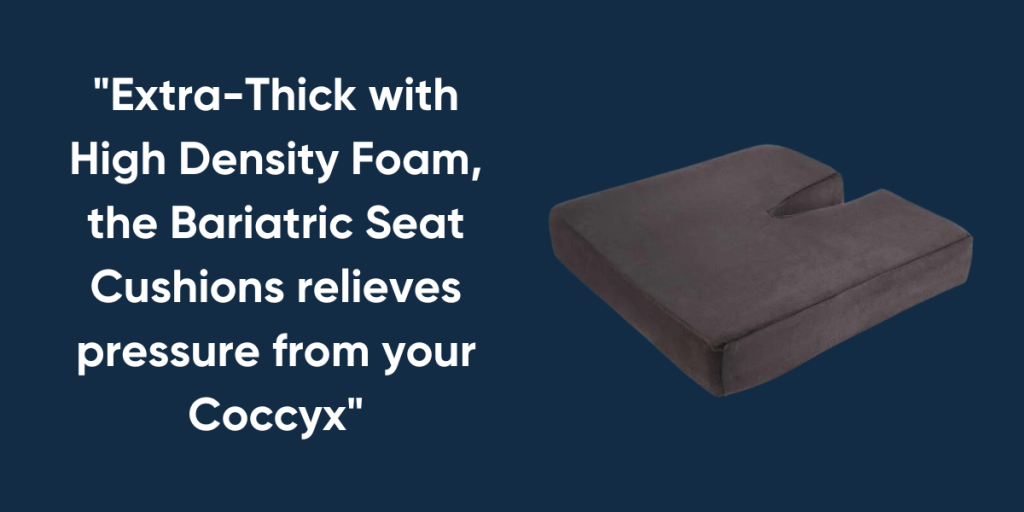
• Coccyx Pain: Specifically targeting coccyx discomfort, the Diffuser Coccyx Cushion has a cut-out design to suspend the tailbone weightlessly, providing relief from pain and soreness in the coccyx area.
• Hip Rotation: For overall stability and prevention of hip rotation, the Diffuser Pommel Cushion features a memory foam construction with a pommel wedge, ensuring the user remains in a stable and comfortable position.
• Large body frames: Individuals with larger body frames, especially those weighing over 110kg, requires the right support and comfort in a wheelchair cushion. The Diffuser Cushion comes in a bariatric size specifically designed to accommodate these needs.
This cushion provides enhanced support and pressure relief, ensuring that even for larger body frames, comfort and posture maintenance are achievable. Its robust design caters to the unique requirements of heavier individuals, promoting better circulation and reducing the risk of pressure sores, thus offering a comprehensive solution for improved seating comfort.
• Incontinence Management: Managing incontinence while seated for extended periods becomes easier with cushions equipped with Steri-Plus covers. These hospital-grade covers are designed to resist moisture and bacteria, making them ideal for hygiene maintenance. They come with a convenient zipper for quick removal and are machine washable, simplifying the process of keeping your seating area clean and sanitary.
Over 50 years of helping wheelchair users to sit comfortably.
Therapeutic Pillows has thoughtfully designed wheelchair seat cushions and supports to address these common issues of discomfort, pain, and posture problems due to prolonged seating, offering a comprehensive solution for wheelchair users for over 50 years.
We are here to address your specific needs, please visit Therapeutic Pillows and contact our customer support team to guide you through the process of selecting the best wheelchair cushions for you.
Yes, the Diffuser Cushion comes in a bariatric size designed for larger body frames, providing enhanced support and pressure relief to accommodate the unique needs of heavier individuals.
 0
0 0
0Yes, prolonged sitting can lead to several health issues such as pressure sores, spinal misalignments, muscle atrophy, and discomfort. It's important to use proper support to mitigate these risks.
 0
0 0
0Using specialized pressure relief cushions and supports, like those offered by Therapeutic Pillows, can help redistribute weight and reduce the risk of pressure sores. Regularly changing your position also helps.
 0
0 0
0Incontinence can add to the challenge of maintaining hygiene and comfort. Cushions with Steri-Plus covers are designed to resist moisture and bacteria, making them an effective solution for managing incontinence.
 0
0 0
0You can reduce discomfort by incorporating cushions and supports designed to alleviate discomfort. These include spine alignment cushions, pressure care cushions, and temperature control cushions to improve posture and relieve pressure points.
 0
0 0
0

